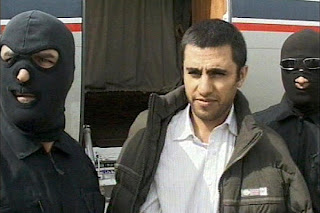
Ali Belhadj and three other well-known and respected leaders of opposition movements were arrested on Monday 31st May while protesting at the American Embassy in Algiers against Israel's heavy-handed response to the Gaza aid flotilla.
The
FIS, readers will recall, was prohibited from taking power in January 1992 by a coup d'état by the country's most powerful generals. After establishing an overwhelming lead in the first round of the very democratic 1991-92 general election, the military stepped in and annulled the second round of voting, which would have secured the
FIS' electoral victory. This military coup d'état took the country into its
Dirty War, from which it has still not fully recovered.
The three men arrested with Belhadj were:
> Dr
Ahmed ben Mohamed, one of the signatories to the
'Sant' Egidio' National Contract in January 1995. The Contract, drawn up and signed in Rome under the auspices of the Catholic
Sant' Egidio Community, was an attempt by the
FIS and most of Algeria's other political parties to establish 'political pluralism' and peace. The notable exception to the talks was the government, which at that time had just received both
IMF and US financial backing (through
Halliburton) and had no desire to end the war.
>
Abdelkhader Dehbi, well known for his frequent writings in
Quotidien d'Algerie, is a leader of the
19th March Movement. Named after the day of the ceasefire between France and Algeria in 1962, the movement, which is similar to the
Rachad movement, was created about two years ago. Its aim is to overthrow the current regime by peaceful means and to establish democratic government in Algeria. Its founder was
Sallaheddine Sidhoun, who also contributes to
Quotidien d'Algerie.
>
Sidhoun is a surgeon who was given a 20-year prison sentence for giving surgical help to the GIA. Instead of going to jail, he went underground. After some ten years, he emerged, made a lot of public noise and went to court, where he was declared innocent! Both Sidhoun and Dehbi were celebrated
maquisards (mujahideen) in the Algerian War of Independence.
In February 2010 (see
Algeria P&S - 19.02.10), Dehbi, who was a close friend of Bouteflika before he became president, asked him to stand down as president as he was destroying Algeria. The full text of Dehbi's letter can be accessed here.
The fourth person arrested was
Lakhdar Bouregaa who was commander of
Wilaya IV in the Algerian War of Independence and a member of the
National Council of the
FLN. He was a founder, alongside Ait Ahmed, of the FFS. Bouregaa was accused of being involved in
Tahar Zbiri's unsuccessful revolt against former president
Houari Boumédiène in 1967, and was reportedly tortured in prison until released in 1974.
The four men went to the US Embassy after Israel attacked the Gaza aid flotilla and asked to see the Ambassador. A diplomat, whose name we do not have, came out of the Embassy to talk with them. The diplomat was smoking a cigarette. Dr Mohamed asked the diplomat to stop smoking in their presence. He accordingly put the cigarette behind his back before throwing it away. The five men spoke for around 15 minutes before plain-clothes DRS officers, who had been observing the exchange, ordered uniformed police to arrest the four Algerians.
The four were physically seized, one by one, and taken away into detention. Belhadj was taken last and was beaten up in front of the diplomat. According to our sources, his parting words to the diplomat were: 'You do not need to colonise us: that is already being done for you by your puppets.' Belhadj was held in detention for about eight hours while the other three were held for about 2-3 hours.
For more news and expert analysis about Algeria please see
Algeria Focus and
Algeria Politics & Security.






























